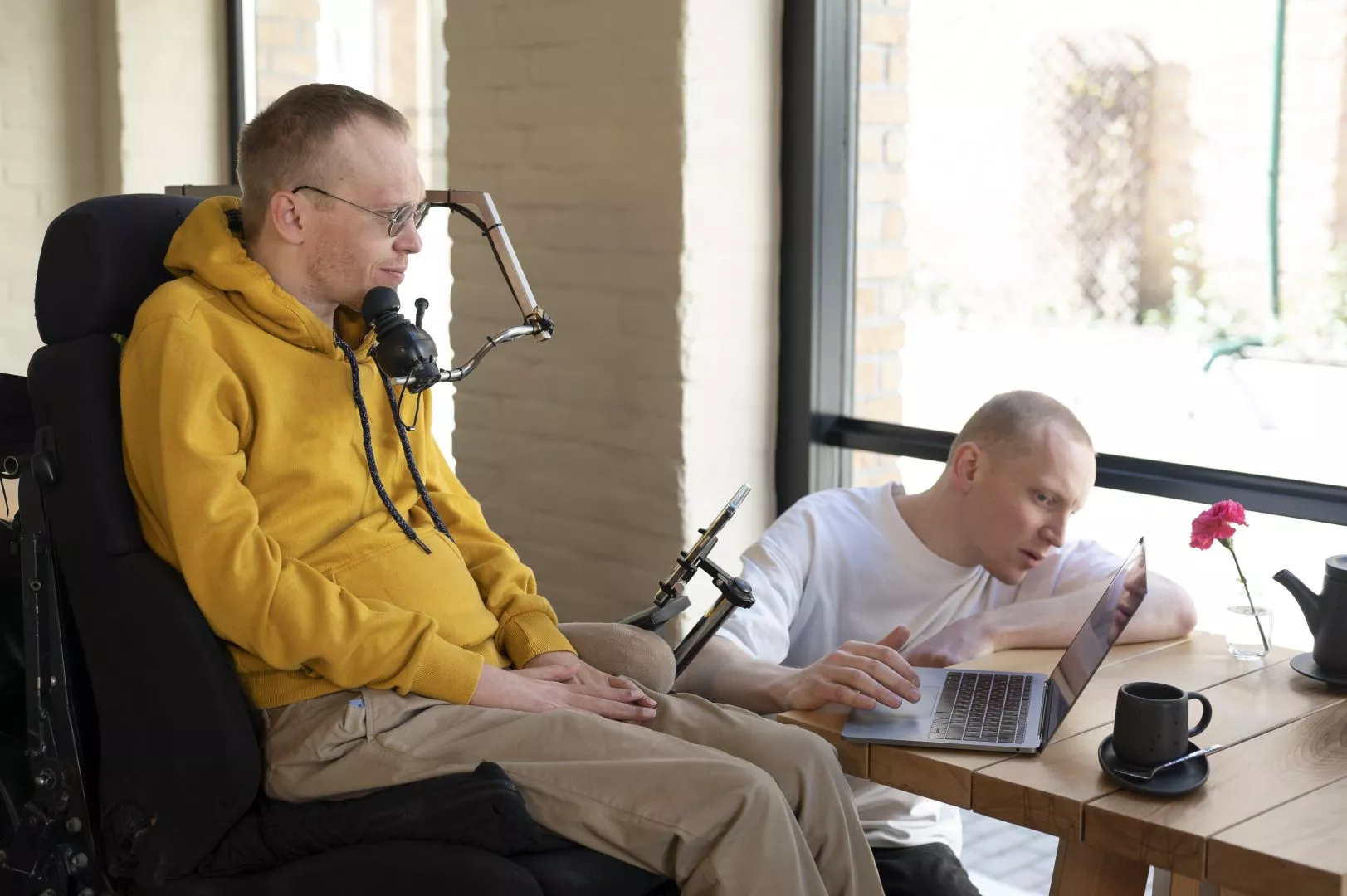Discover the different types of disability care availa ble at home. We look at the benefits of each type of care, how to assess what your loved one needs, and tips for selecting the right care provider.
Support in Your Home
In-home care services are specially fashioned to assist people in living as independently as possible within the cosy confines of their homes. These types of services embrace a diverse range of personal care, this can include assistance with washing, getting dressed, and the preparation of meals.
Moreover, the services go beyond just personal care as they ensure the maintenance of a clean and safe environment. This is quite imperative as it enhances easy movement and reduces the risk of any accidents within the home. Needless to mention, such services provide the necessary companionship required for emotional and psychological support.
One significant type of care that takes place in the home is live-in care. This arrangement sees the carer living under the same roof as the person who requires care, providing assistance around the clock. It's particularly effective for individuals with physical disabilities to maintain their independence.
Furthermore, it brings immense aid to individuals with conditions such as dementia who require constant companionship and support. Another suitable option that is beneficial is Day Care at home. This particular service provides much-needed breaks for family carers.
Additionally, it offers a host of engaging activities that keep the individual with a disability entertained and happy. The services offered are tailor-made to make life better and boost happiness.

Equipment and Adaptations
Assistance for a person dealing with impairments does not only consist of personal care. A crucial part of enabling individuals with disabilities to live a more independent and comfortable life at home lies in the equipment and adaptations made available to them.
This type of support may include the installation of assistive devices or making necessary changes within the house. Home adaptations could involve multiple adjustments, such as installing grab rails in particularly steep areas to help individuals move around more securely.
For some, ramps could be installed to make navigating ground levels within the house easier. Stairlifts may also be fitted for those who have trouble using stairs, effectively reducing the risk of accidents.
Certain adjustments may also be made to the home's structure. This might include widening doors for better movement and space or adapting entire rooms, such as bathrooms, for user-friendly use. For example, the bathroom might be outfitted with a raised toilet seat or a walk-in shower to allow individuals to use these amenities more comfortably and safely. These changes can dramatically increase the level of comfort and autonomy for the person with a disability.
On the equipment side of things, simple aids can range from walking sticks and standing frames to help those with limited mobility move around more safely and confidently. However, some individuals may require more advanced appliances, such as wheelchairs or hoists, to assist in crucial daily tasks such as getting out of bed or using the bathroom.
Adjustable beds can also be considered as they offer the flexibility and comfort needed for a good rest. Moreover, technological innovations have paved the way for an astounding variety of electronic devices and aids. Devices like computer software, electronic communication devices, and environmental control systems can be personalised to meet the specific needs of the person.
Entertainment needs may be met by customisable smart devices and gaming consoles. This multifaceted approach helps ensure that every element of the home environment is conducive to the person's overall comfort and independence.
Leisure Opportunities
Having a quality life isn't just about the everyday, mundane aspects of existence. Instead, it's about the ability to participate in and enjoy recreational activities and personal interests.
This is especially vital for individuals with disabilities, who can often feel excluded or limited in their ability to engage in leisure pursuits. Whether it's participating in a local community group or club, chasing a hobby or passion or arranging for visits to places of interest such as museums, parks or theatres, these opportunities carry with them a range of benefits.
They're not just fun - they can also offer physical, social and mental nourishment. Active involvement in leisure activities can provide a sense of achievement and purpose. It can enhance physical abilities, contributing to overall health and wellness.
However, the benefits are more than just physical. Engaging in leisure activities also has social benefits, providing opportunities for social interaction and developing friendships. They can help provide a sense of belonging in the community.
Furthermore, these activities can have psychological benefits too, offering an outlet for stress and a boost to mental well-being. For individuals who may find it challenging to travel independently, support may also extend to the use of transport services. Organisations ensure that transport is made accessible, allowing everyone to enjoy life to its fullest regardless of their physical limitations.


Financial Help
Taking care of someone at home can come with a significant financial cost, and that's why there are measures in place designed to help ease this burden for individuals and families. In fact, there are a number of grants and benefits available, specifically put in place to assist those who are dealing with the financial aspect of disability care.
These can include the Disability Living Allowance, which is there to support individuals who have extra care or mobility needs as a result of a mental or physical disability. Additionally, there is the Personal Independence Payment, which is a benefit for people who might need help participating in everyday life or getting around because of a long-term illness or disability. There's also the Employment and Support Allowance.
This benefit is there for those individuals who are unable to work due to illness or disability, offering them some financial support. Local authorities can provide additional support too in the form of direct payments. These payments represent a cash amount that is paid to the person requiring care or their family, and they can choose how to spend it.
Whether it's to organise the type of care they prefer or to buy specific equipment or services - this gives them the flexibility to choose what's best for their individual care needs. Understanding these financial support options can help make home care more manageable and allow individuals to focus on the care and well-being of their loved ones, rather than worry about the associated costs.

Employment
For a number of individuals with disabilities, being part of the workforce is an aspiration that may often be hampered by various challenges. These challenges range from access to job opportunities to the need for special modifications at the workplace to facilitate their productivity.
This is where employment support services play a critical role in assisting these individuals in overcoming obstacles and reaching their employment goals. Employment support services are designed to help individuals with disabilities prepare and secure suitable employment. The support provided is multi-faceted and addresses a variety of needs that these individuals may have.
One of the key services they provide is job readiness training. This involves equipping individuals with the necessary skills to work effectively in their chosen jobs. From increasing their knowledge about the tasks required in specific jobs to helping them develop critical social skills for workplace interaction, job readiness training gives these individuals a competitive edge.
In addition to training, employment support services also advocate for workplace modifications to enable individuals with disabilities to carry out their roles effectively. These modifications could include physical changes like installing ramps or ergonomic workstations, as well as implementing technology solutions for those with sensory or cognitive impairments.
Subsidised wages form another pillar of support that helps ensure the financial viability of employment for these individuals. By partially covering the wages of employees with disabilities, these subsidies encourage employers to open up more job opportunities for this demographic. Beyond training, workplace modifications, and wage subsidies, employment support services also provide additional services to further assist individuals with disabilities.
One such service is job coaching, where experts help these individuals navigate the complexities of the work environment and manage their job responsibilities effectively.
Supported employment programs are another crucial offering of these services. These programs create a supportive environment and provide ongoing assistance to individuals with disabilities, aiding them in securing and maintaining employment.
We offer specialist home care services and physical disability care for vulnerable adults throughout London. Get in contact today if you have a loved one that would benefit from care at home.

